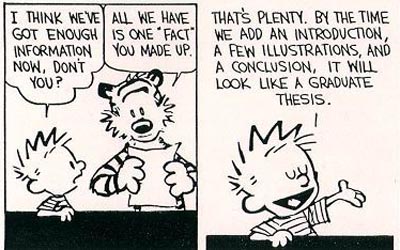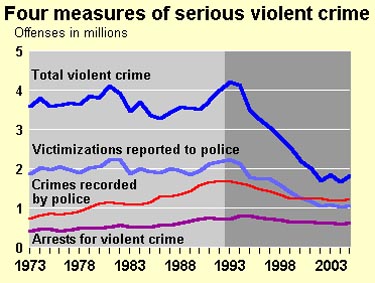I greatly enjoyed the book “Freakonomics”, but I was skeptical when Levitt set forth to “debunk” the alleged “bad science” that is prevalent in today’s scientific world and I have distain for anyone who uses rigged and biased studies to support their pre-conceived conclusions.
I liked Freakonomics only because it is a fusion of statistics, economics and sociology, but its’ very premise suggests that the research he debunks is basically flawed. Even the apples-to-oranges picture on the book cover says that the studies he cites are invalid:

I’m always skeptical of people who seek to discredit and “debunk” the works of others, and most of the “debunking” articles that I read are full of baloney. It also begs the question about whether it’s OK to defame someone’s research on mere speculation and perhaps ruin their reputation, simply by authoritatively citations of "possible" alternative explanations.
Levitt makes many convincing arguments in Freakonomics, but unlike those he seeks to debunk, we do not see empirical evidence in the book. When I was growing up in New Mexico in the 1960’s, all elementary school children had to watch Dr. George Fishbeck every week, a real-deal scientist who taught thousands of children how to recognize crap science:

Scientist, Dr. George Fishbeck
Lawsuits to stop rigged debunk defamation
In my own observations, the people who like to “debunk” the research of others are giant assholes, often motivated by malice and jealousy. As a general rule, I’ve noticed that many “debunkers” take great poains to sound intelligent, spouting meaningless tautologies and citing “rigged” proofs, just to defame their competitors. I think that many professional debunkers do it to shore-up their low self-esteem and to make them feel better about their lack of success.
Telling Lies for fame and fortune
It gets interesting when a “debunker” becomes wealthy from their “debunking”, especially when they cheat, lie and publishing deliberately rigged “proofs”.
The tables are turned when money is involved, and "real" scientists whose research has been unfairly “debunked” by publicity-seeking pseudo-scientists are now rightfully seek restitution using libel and defamation laws.
Author Stephen Levitt became a book royalty millionaire by applying common sense and social observations to statistical studies, but some say that Freakonomics deliberately misleads and deceives, unfairly discrediting legitimate research.
The landmark book “How to Lie with Statistics” is the “debunkers” dreams, a book that shows how to deceive by rigging statistics.

The attacks on false debunking
For example, Freakonomics makes rediculous leaps of causation. Levitt claims that crime rates fell as a result of legalized abortion in 1973 and Levitt makes the compelling, yet unproven, argument that unwanted children are more likely to drift into crime.
This article suggests that the author Steven Levitt may have been wrong in his conclusion that the higher abortion rates after Roe v. Wade, 1973, resulted in lower crime rates.

For other trends, the DOJ has plotted crime rate data since 1973 and notes a dramatic drop in crime rates starting in 1993. Ah, Levitt notes that 1993 was the year that the aborted fetuses would have been 20 years-old, prime-time for criminal activity.

USA crime rates started dropping in 1993
But Levitt does not consider other possible factors such as the 1993 creation of the Ruby programming language by Yukihiro Matsumoto. Based on Levitt's "observational" approach, it's just as possible that the crooks simply gave-up crime to pursue a career in Ruby programming . . .
The Freakonomics lawsuit - justice for all
Freakonomics author Levitt is now being sued by firearms scholar John Lott, the publisher of a study suggesting that allowing concealed weapons reduced crime, a theory which was “debunked” in Freakonomics. Unfortunately, most readers of Freakonomices don't know that “debunkers” are usually full of crap.
John Lott says that Levitt cheated and lied when he “debunked” his study. More onerous, Lott claims that Levitt libeled him when he wrote a lie stating that Lott used his wealth to “buy” whole issue of an academic journal, just to run research that supported his theory. Below is the alleged libel. It sure sounds like a statement of fact to me, and Levitt is going to be hard-pressed to find a judge who is stupid enough to believe that this is just his opinion:
“It was not a peer refereed edition of the Journal. For $15,000 [Lott] was able to buy an issue and put in only work that supported him.
My best friend was the editor and was outraged the press let Lott do this.”
Moreover, Levitt has been charged with “misleading” the Freakonomics readers by suggesting that there is a “broad consensus” that Lott's study is wrong, a statement of fact that Lott says is a lie, a lie that falsely hurt his academic reputation.
The judge has already ruled that Levitt's publication is actionable, meaning that it does indeed defame him. The next hurdle is easy:
- Lott must prove that the statement is false
- The judge must decide if Lott is a “limited purpose public figure”.
If the judge rules that Lott is a public figure, he will have to prove that Levitt acted with malice and a disregard for the truth. From what I read, that's not a hard stretch, given his casual justifications for the Freakonomics "debunkings".
We have enough junk science already, thank you:

Junk Science misleads the masses
Let’s put credibility back into scientific research
Go get ‘em, John. Let’s hope this this judge sends a message to liars and “debunkers” that they cannot become rich and famous by unfairly trashing the hard-earned reputations of legitimate scientists.

